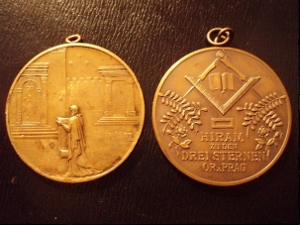A brief history of Hiram Lodge, Prague
Author: J. Sadilek

1. Introduction
Hiram Lodge (original name Hiram zu den drei Sternen, Hiram at the Three Stars) was founded 17 November 1909 in Prague. There were 42 Founder members. The ritual consecration took place on 2 May 1910 in Bratislava.
It was the first modern lodge to be established in Prague for 125 years. The structure of freemasonry at that time in the Austro-Hungarian Empire was somewhat peculiar and asymmetric. The Empire had one Emperor, Francis Joseph, but two monarchies and consequently two governments and parliaments.
In the Austrian part of the monarchy, to which Vienna and Prague belonged, freemasonry had been forbidden since 1795. Whereas freemasonry was legal and had been allowed in the Hungarian part of the monarchy from 1867. Budapest and Bratislava (Pressburg in German and Poszony in Hungarian) belonged to the Hungarian part of the monarchy. The symbolic Grand Lodge of Hungary, based in Budapest had lodges widely spread over today`s Hungary, Slovakia, Croatia, Serbia and parts of Romania (Transylvania) and Ukraine (Ruthenia). The membership reached around 7000 brethren. It maintained an official relationship with the United Grand Lodge of England.
Vienna, which is close to Budapest and Bratislava, had a growing and educated middle class who had significant potential to be freemasons but by the laws of the Austrian monarchy they could not establish lodges there. Lodges were therefore established in Bratislava, only one hour's travel from Vienna. All open lodges and rituals were done there, whereas in Vienna only charitable associations were registered which held "humanitarian" lectures. In total there were 12 Viennese lodges, based in Bratislava operating in this way. This Grenzlogen (Border Lodges) moved after WWI to Vienna, where they could now freely function under the democratic constitution of the new Austrian Republic.
Around 1900, Bohemia had few hundred freemasons. Most of them had been initiated into the Viennese Grenzlogen. Others were members of lodges in neighboring Prussia, Saxony, Bavaria or even in more distant places.
The brethren were mostly businessman, traders, lawyers, doctors or artists, who traveled throughout in Germany and Austria and through their business contacts had been introduced to lodges there. At home they had formed so- called Masonic clubs in Plzen, Karlovy Vary, Marianske Lazne, Zatec, Teplice, Liberec and other places.
In Prague they formed two Masonic clubs: Amicitia and Harmony with a total of nearly 70 brethren.
